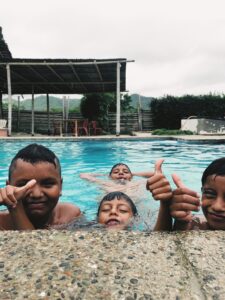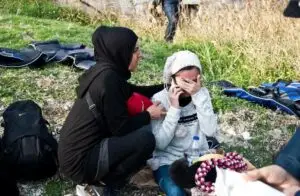
About my books
An (Auto)-Biography, with something on the side.
Middle East
It all started with the autobiography The Long Way Home, which was a story of my years as a soldier for the cause of peace in the Middle East. An experience that made inerasable impressions, and which have affected everything I have written since. The book was published in 2001, and again in 2011, and is purchased by the Norwegian Military for the purpose of educating new soldiers.
TLWH made me want to write more about the conditions in the Middle East, and especially about the destinies of individuals. The result was the thriller Delete. The book deals with the problem issues between Israel and the Palestinians.
The basis for the plot was a description of the ultra conservative branch of Shin Bet’s attempts to achieve The Final Solution in the Palestinian areas. The book was very much noticed, and I got murder threats from an obscure, forbidden, Israeli terror organisation called Kahane Chai.
Rwanda
The book was well received and sold well both in Norway and Denmark.
During the research for Delete I stumbled upon several American Senate Hearings regarding the massacres in Rwanda. I was surprised by the very low concern the world as a whole seemed to show about this gruesome genocide. And this in a period in which UN forces could observe up to 70 000 children in the ages 3-5 with none other care provider than a brother of sister.
Nobody knows how many children that were killed by predators, or who died in the massacres, but one is certain that many just disappeared. Again, I wanted to write a story based on the experiences of the individuals. I grabbed hold of the industry around paedophiles, which is increasing day by day, and wrote the book about where these children ended up – Dreamland.com. The narration is situated ten years after the massacre, and displays how cynical trafficking functions almost without hindrance on the internet.
Iraq
I usually say that all my books are born towards the end of the last one. This was also the case with Endgame.
In 2005 I, as the first Norwegian soldier in international service, went on with a lawsuit against the Ministry of Defence. My view was that the state was in responsible of the injured soldiers, not only while on service, but also when they are returned, and the cause for the injury is the international service. It was a case of principle, and the whole country was engaged in it.
After two rounds in court, where my demands won through, I must honestly say that my belief in honest politicians who are aware of their responsibilities was almost non-existing. With this discussion about Norwegian engagement in Afghanistan, the plot for Endgame matured. I noted that our politicians were more than willing to offer the Norwegian soldiers for duty in Iraq, the Balkans and in Afghanistan, as long as this served the politicians’ interests.
Endgame was a confrontation with the West’s engagements in Iraq. I questioned where Saddam’s 20 billion dollars went and, last but not least, who was really behind the sentenced Norwegian grand spy; Arne Treholt. In Endgame, I provide the answers.
The Balkans
The research for Endgame gave me information about things that happened in Balkan and in Kosovo. The NATO bombing of Kosovo was illegal warfare. Our Prime Minister called this a humanitarian intervention. Politicians’ language like this provokes me.
Through my work with Endgame, I gained access to loads of secret information that involved German, French, English and American governments. I quickly discovered that the material deserved a book. The Norwegian role in the Balkans is also very controversial. In Fastball, I explain why.
The narration is in London, the summer of 2006. Tom Falck is hired as liaison for a new British “FBI”, a bureau called Serious Organized Crime Agency. SOCA surveys three former Norwegian soldiers who are meant to be behind trafficking of women to England in trade with a load of weapons from a hidden IRA-depot to Kosovo. What nobody knows is that the women are not to be prostitutes, and that the weapons are only there to cover up for something far more dangerous.
Some times the cliché proves itself right; reality surpasses fiction. The research for Fastball uncovered things that was seen as news flashes the following year.
The writing of Fasball created a lot of “noice”, witch made me more eager to carry on researching for the story behind the story. I wrote an article in one of the largest Norwegian newspapers about the Racak massacre and that led me to a lot of new inputs for my next book about the Kosovo war.
Aftermath was about how the murder of Per Paust and his wife Anne Ordered Paust was linked to the arming of the UCK in Kosovo. I obviously touch some nerves because I received deaththreats after publishing of this book. I continued by writing the book: The 4. Service – about the secret intelligence in Norway, again close linked to the Balkan and Kosovo affairs.
Norway
I felt the need to comment on the astronomically high budget Norway is going to use on buying F 35 combat fighter planes in the years to come. Solefall is situated in Norway, actually near my own home, but nevertheless I hope it is thrilling.
I published Solefall in may 2015. Its more of a crime/suspension book, while I am currently working on my next novel, witch will be the “closurebook” of the Kosovo affairs.
Back to Kosovo
All my books are close linked to actual events and documented crimes. I often underline that I do not write war stories. None of my books are explicitly about the military. But where others use the police officer or the journalist to drive the narration forward,
I let Tom Falck, former military, be my protagonist. Tom Falck is a thinking, living human being, with a background that allows him to see things a little bit differently than the rest of us. Tom represents mine (and the readers’) window to the story, and all the books are closely linked with reality.
Whoever reads the books will, because of this, get a good insight in themes that are important today but never were meant to reach the public’s ears. Many people will disapprove that such things are spoken of, but from my opinion (and Tom’s), it is about time we take away the conception of Norway as an innocent and peace loving actor in world affairs. We are the world’s sixth largest weapon’s provider, and achieve, in many controversial ways in the world conflicts.
It is no secret that I use many of my own experiences in the books. I have not seen or heard half of what Tom has, but it is not difficult for me to engage in the emotional aspects of being shot at, stalked or being subjected to threats, let down or being under surveillance.
All of these things I have experienced in one way or the other. But grief, longing, joy and love are also important aspects in my books, and are emotions we all have experienced at times and can relate to. I am only trying to describe all of this in an exciting and entertaining way. And perhaps the reader will gain useful knowledge and an epiphany in the bargain?
My books are all given very good reviews in Norway, but I may say: not everyone appreciates my writing about these topics.
About the author:
Knut Arnljot Braa (b. 1962) is educated engineer and economist, and has worked in the commercial business for about 20 years. He has served as UN soldier in Lebanon for two periodes. I 2006 he won the case against the Norwegian Ministry of Defence, advocating for compensation to veterans for injuries caused during service.
Braa has prior to the novels published the auto biography The Long Way Home – a book that caused discussion and debate in the Norwegian military. The issues regarding veterans has been important to Braa for many years, and the books about Tom Falck reflect this. Braa lives in Trondheim with his partner and their daughter. He has written eight thrillers, and one biography. Three are published by former Damm and Cappelen, four by Piratforlaget and one for Vigmostad& Bjørke (the third largest publisher in Norway) This autumn, his eight thriller Solefall appeared. He is currently writing on his ninth. thriller.
Everything Braa writes reflect an active engagement in society, where exciting and controversial plots are closely bound to today’s and tomorrow’s international happenings, but at the same time anchored in the destinies of individuals.
The Long Way Home – 2001
Delete – 2003
Dreamland.com – 2004
Endgame – 2008
Fastball – 2009
Aftermath – 2010
Den 4. Tjeneste. (The 4. Service) – 2012
Solefall – 2015
Miltons disciples-2024
Rights and copyrights
I currently have all the rights to all my books. I am open for cooperation with publishers abroad. Contact me at: knut@braa.net

What is a lifetime, really?
Twenty good years? A good friend of mine once said while walking in the mountains of Gran Canaria.“Knut, we have twenty good years left. Use

How to protect yourself from your PTSD, when the world is on fire
(It is war. And it is mine. ) The headlines that meet me today are about the war in Ukraine. Alarms going off, people fleeing,

The thin film of civilization
The thin film of civilization This picture are taken on Lesvos. Her husband and baby drowned on the way over from Turkey. This is a